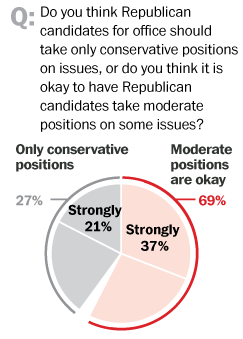There's a lot of information to be gleaned from this Washington Poll. Most of it isn't terribly surprising — for example, Republicans really really really don't like Obama. In this sense, the Republicans are united. In fact, Republicans appear to be very united in what they don't like, including their dissatisfaction with their own party (In 2005, 76% of Republicans were satisfied with the direction set by the party's leadership; now that number is 49%. About a third believes GOP leaders do not stand up for the party's "core values.".
And they love them some Fox News. Some 46% of them watch it regularly.
But the WaPo poll stress not only their unity, but their division. And they are that, too. About a third of Republicans believe the GOP should spend more time opposing gay marriage, but nearly as many believe the party should do the opposite. About a third of Republicans want to see more focus on abortion, and nearly as many prefer less. GOP voters expressed concern about taxes, spending, and the economy, but that's pretty much what the party leadership focuses on already. To me, however, this one graphic explains the whole divide:
 It shows that the Republicans are even split (more or less) on whether to be conservatively pure, or to allow for moderate positions.
It shows that the Republicans are even split (more or less) on whether to be conservatively pure, or to allow for moderate positions.
That's bad enough, but note that 58% feel strongly on whether to be conservative-only versus moderate-accomodating. And I'll venture to guess that the 21% (let's call them the "teabaggers") are a lot more vocal than the more moderate 37% (let's call them the "big tenters").
This is where the friction is, and will be, for several years.
The problem for the GOP is, in order to get control of Congress and the White House, they need to appease both the tea baggers and the big tenters. But what kind of candidate fits both those camps? Remember, these voters feel "strongly" about their positions.
In the end, if 2012 presidential candidate X is too conservative, eschewing moderate positions, enough big tenters might stay at home and not vote at all, or even vote Democratic. Result? Candidate X loses. On the other hand, if Candidate X has more moderate views, the teabaggers might stay at home, or vote for a third-party candidate. Result? Candidate X loses. Either way, it's a Democratic win.
When 58% of a political party holds opposing views and is strongly entrenched in those views, the political party lacks sustainability. To paraphrase another Republican, a house divided cannot stand. This is good news for those seeking the emergence of a third party, including Democrats who would love to see the "other side" divided and conquered.

